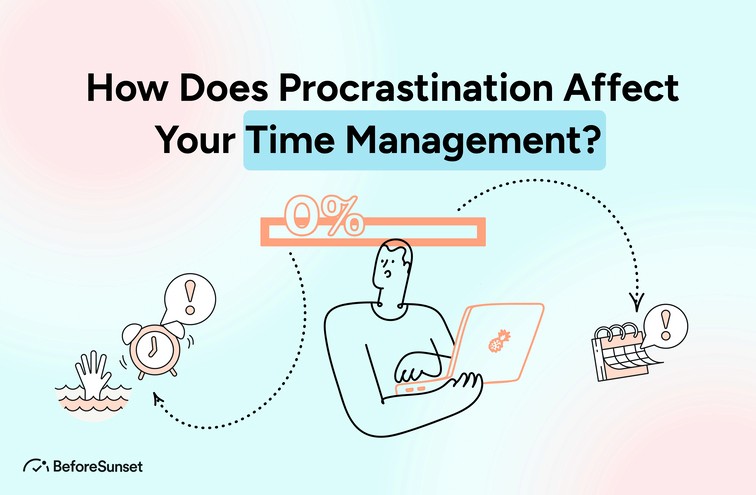Procrastination can be a killer when it comes to managing your time. In this blog post, you'll learn just how procrastination affects your time and what the best way to conquer it is.

1. What is Procrastination?
Procrastination is the practice of delaying or putting off important duties or actions, usually in favor of more enjoyable or simple pursuits. It entails delaying crucial or required chores despite being aware that doing so might have unfavorable effects or leave one feeling guilty.
There are many people who are affected by procrastination to varied degrees. It may happen in a variety of spheres of life, including job, academic pursuits, individual objectives, and everyday obligations. People frequently put off doing things out of laziness, trouble focusing, fear of failing, perfectionism, or feeling overburdened by the work at hand.
Although procrastination may offer momentary solace or instant satisfaction, it frequently results in greater stress, decreased productivity, missed deadlines, and subpar job quality. The cycle of guilt, anxiety, and last-minute rush to finish chores that procrastinators frequently go through can have a severe effect on their general well-being and sense of achievement.
With this info your reward will be understanding to overcome procrastination.
2. The Causes of Procrastination
There are several underlying causes and contributing elements for procrastination. Here are a few typical reasons why people put things off:
Lack of motivation: It is simpler to put off or completely ignore a work when it lacks personal interest, intrinsic worth, or obvious benefits.
Fear of failure: Some people may experience anxiety and avoidance of activities because they worry that they won't live up to their own or others' standards.
Perfectionism: Striking for perfection may be crippling because people may feel too stressed or anxious about creating mistakes. This may cause delays in the beginning or end of work.
Task initiation challenges: Some people have trouble starting activities because they find it difficult to get over the initial barrier.
Lack of organization or unclear goals: It might be challenging to prioritize and take action when activities are poorly defined or goals are not clearly specified.
Overwhelm and task aversion: Facing a significant or complicated work can be scary. As a result, people may become overwhelmed and choose for more fun and quick pursuits.
Problems with time management: Underestimating the time required for a task or waiting until the last minute to start anything might cause delays and add to your stress.
Poor attention and distractions: It can be difficult to concentrate on work when there are interruptions or distractions present, such as social media, cellphones, or a setting that encourages them.
Lack of external accountability: Without external accountability or deadlines, some people may find it difficult to remain disciplined and motivated in finishing activities. Low self-esteem: Procrastination can be caused by a lack of confidence in one's talents or a fear of criticism.

3. How Procrastination Affects Productivity
The productivity of an organization may suffer from procrastination. When we procrastinate, we put off starting or finishing activities, which reduces the amount of work we get done overall. It frequently leads to a last-minute rush to finish duties, which increases stress and lowers the caliber of work.
People who procrastinate could find that they make mistakes that could have been avoided or produce work that falls short of their customary standards. Additionally, procrastination may start a vicious cycle of shame, worry, and self-doubt that further reduces productivity.
As a result, we become distracted from vital work and instead participate in fun or less necessary pursuits. Procrastination ultimately results in missed deadlines, higher responsibilities, and an overall feeling of being unproductive, therefore it's critical to confront and break this behavior for enhanced productivity.
4. How Procrastination Affects Our Everyday Life?
Our daily lives are tremendously impacted by procrastination. As we deal with unfinished business and approaching deadlines, it breeds a pervasive undertone of tension and anxiety. It reduces our productivity and keeps us from successfully completing our tasks and obligations.
Missed chances, poor decision-making, and damaged interpersonal relationships can all be results of procrastination. Due to hurried attempts, it damages our self-confidence and results in worse quality work. We struggle with time management, which results in a vicious cycle of procrastinating on duties, racing to do them, and ignoring other significant facets of life.
Procrastination ultimately has a negative impact on our general wellbeing, making us feel overburdened, mentally exhausted, and unfulfilled in our everyday lives. Gaining control, lowering stress, increasing productivity, and finding more happiness all depend on beating procrastination.

How Does Procrastination Waste Time?
Procrastination is the act of delaying or putting off tasks or activities that require immediate attention or completion. While it may provide a temporary sense of relief or avoid immediate stress, it can be highly detrimental and waste valuable time in several ways:
Missed Deadlines: Procrastinating on important tasks often leads to missed deadlines. This can have serious consequences in both personal and professional settings, as missed deadlines can result in lost opportunities, financial penalties, or damaged relationships.
Increased Stress: As the deadline approaches, the pressure to complete the task increases, leading to elevated stress levels. Chronic stress can negatively impact mental and physical health, reducing productivity and overall well-being.
Inefficient Use of Time: Procrastination often involves engaging in unproductive or less important activities instead of focusing on the task at hand. This can lead to a waste of time on trivial matters, leaving less time for essential tasks.
Quality of Work: Rushing to complete a task at the last moment can compromise the quality of the work. Procrastination may not allow for sufficient time to review and revise the work, leading to errors and subpar outcomes.
Lack of Preparation: Procrastinators may not adequately prepare for tasks in advance, which can hinder their ability to perform well. Proper preparation is crucial for complex tasks that require careful planning and execution.
Missed Opportunities for Growth: Procrastination can prevent individuals from taking advantage of learning opportunities or pursuing personal development. Time that could be spent on acquiring new skills or knowledge is instead wasted on postponing tasks.
Negative Impact on Relationships: In professional settings, procrastination can affect teamwork and collaboration. Colleagues may have to pick up the slack, leading to resentment and strained relationships.
Lowered Productivity: Procrastination disrupts the flow of work and productivity. Tasks that could have been completed efficiently if started earlier end up taking more time due to procrastination.
Guilt and Regret: Procrastinators often experience feelings of guilt and regret for not using their time wisely. These negative emotions can further demotivate and perpetuate the cycle of procrastination.
Cycle of Delay: Procrastination can become a habit, leading to a perpetual cycle of delaying tasks. Breaking free from this cycle may require significant effort and self-discipline.

What is Procrastination Harmful To The Success Of?
People who procrastinate are less likely to succeed in several areas of life. It impedes academic success by resulting in subpar grades and lost learning opportunities. It prevents career progress in workplaces because it causes duties to be put off and chances to be lost.
Procrastination hinders development and decision-making, which has an adverse effect on personal initiatives, fitness and health objectives, and financial stability. Relationships suffer when essential discussions and confrontations are postponed, and entrepreneurial endeavors fail when crucial choices are postponed. Additionally hindering goal achievement and skill acquisition, procrastination prevents personal growth and advancement.
In the end, it hinders productivity and time management, leading to inefficiency and stress. For success in the academic, professional, personal, and emotional sectors of life, procrastination must be addressed.
Why Is Procrastination Bad For Your Learning?
Because it interferes with your capacity to efficiently absorb knowledge and prevents the building of crucial study habits, procrastination is damaging to your ability to learn. Delaying your engagement with the learning materials or your completion of the tasks deprives you of critical practice and understanding time.
Procrastination causes attention to wane, which results in rushing through activities and just superficial learning and retention. Additionally, procrastination promotes a destructive loop that weakens self-control and drive, making it even more difficult to participate in learning in the future.
It hinders your ability to properly explore topics, engage in discussion with classmates or instructors, and reflect on the information, which ultimately hinders your overall academic development and knowledge gain. Procrastination must be avoided in order to improve learning results, and discipline and consistency in study methods must be developed.

Proven Strategies to Overcome Procrastination
Procrastination may be overcome with deliberate effort and the use of practical tactics. Here are some tried-and-true methods to help you stop procrastinating:
Set clear goals and deadlines: Clearly outline your objectives and divide them into smaller, more achievable activities before setting deadlines. For each assignment, establish definite due dates to instill a feeling of urgency and accountability.
Prioritize tasks: Prioritize your duties by deciding which ones are the most crucial and urgent. Prioritize doing important chores first to avoid delaying or skipping them.
Break tasks into smaller steps: Tasks should be broken down into manageable pieces since they can be daunting and a cause of procrastination. Divide them into smaller, easier to handle steps. As a result, the duties seem less overwhelming and progress is felt to be being made.
Use time management strategies: Apply strategies like the Pomodoro Technique, where you work for a certain amount of time (for example, 25 minutes) before taking a little break. Intervalizing your job helps you stay focused and avoids fatigue.
Eliminate distractions: Find a quiet workspace, turn off your phone or computer's alerts, or use internet blockers to prevent access to time-wasting websites and applications to identify and remove potential distractions.
Practice self-discipline: Developing self-discipline requires setting up routines and adhering to them. Train yourself to begin projects right away and resist the urge to put off doing them.
Find accountability: Tell someone who can keep you accountable about your objectives and due dates. This person might be a friend, coworker, or mentor who can follow up on your progress and offer encouragement and support.
Overcome perfectionism: Recognize that perfectionism may lead to procrastination and work to overcome it. Set reasonable goals for yourself and concentrate on improvement rather than perfection. Always keep in mind that finishing a task is preferable to never starting one at all.
Create a conducive work environment: Establish a productive workplace by setting up a comfortable environment. Clean up the mess in your workstation, arrange everything, and create a relaxing, motivating environment to aid with concentration.
Reward yourself: Reward yourself by setting goals and incentives for achieving them. As a reward for reaching your objectives, treat yourself to something nice, but watch out that the rewards don't turn into distractions in and of themselves.
How Can BeforeSunset Help You With Procrastination
Productivity is not only about time management but also about setting realistic expectations and automating processes whenever possible.
With modern tools like BeforeSunset, procrastination can be greatly reduced and time management can be easily improved. This helps create an environment of increased job satisfaction and improved productivity.


